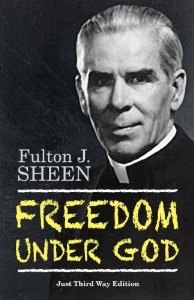If I told you right now that you might understand politics in a completely different light, just by reading one book, would you believe it?
When I first received my copy of Freedom Under God, by the renowned televangelist and radio speaker, Fulton J. Sheen, I was remiss not to note what an influence this man has had on our country and in the Catholic church in the world. A friend at my Catholic church pointed out that his cause for sainthood began in 2002.
I took heed, and in turn, have developed a deep respect for his writing. I found Freedom Under God readable and quotable, but also dense, like something by C.S. Lewis.
In 1940, Fulton J. Sheen was writing against Communism, which he described this way: “in national life, it is the result of the irrelevance of redemption and brotherly love.” He denounces the Capitalist way as well, citing a higher path, a truly Christian path.
The question of whether or not Church matters to the issues of politics is still as relevant today as it was then.
He said there are two great falsehoods: that the church be irrelevant to public affairs, such as: "I don’t bother the church, why should the church bother me." He said this “became the fallacious catchword to justify the divorce of two things which were meant to be as inseparable as head and body” (p. 4).
The other great problem is to say the Church is inimical to public affairs, in other words, that it is harmful, or adverse.
Sheen says we should make room for Christ in political affairs and in business. The Catholic Church offers an alternate way. He urges that we consider redistribution of wealth and private property, so that neither Capitalism nor Communism are pervasive. This does not mean the vow of poverty, he clarifies. He desires that workers be free of bondage to their industry, meaning that they have the freedom to own property (and not rent).
His writings are very quotable. For instance, in this book, Sheen speaks on economic injustice:
“What shall it profit a man if he gets his closed shop but loses his soul? Surrender ownership of productive property to a few capitalists or a few dictators and you will get your mess of porridge with a ticket to a theater thrown in free, but it will only keep you quiet” (p. 39).
Sheen warns against pervasive relativism, which shuns Truth “with a capital T.” He urges that the Church be heard even in economical and political realms. It is for the good of the state. He also reminds us that freedom can never mean lawlessness. Freedom means the ability to do what is right.
He states where he takes issue with Capitalism:
“There is little responsibility in monopolistic Capitalism… Those who manage the corporation say they do not own, and they who own say they do not manage. It is extremely difficult….to fix the blame for injustices.” (p. 57, chapter entitled, “Communism, Capitalism, and Liberty").
As I mentioned before, Fulton Sheen, who died in 1979, is currently under consideration for sainthood. We should listen to this very wise man.
It is common for Americans to learn Capitalism and all things Capitalism in school, but now we are facing a different agenda. We would do well to consider that there might be an even better way, and it is neither Capitalism, Communism, nor Liberalism. We would do well to consider that Sheen’s very keen opinions about politics are just as relevant today as they were just a few decades ago.
Today we have all manner of political and economic injustices. One way in which Sheen’s writing applies to us today could be the industry of chocolate, in which many are deprived of just wages and work in poor conditions. They are slaves of an industry and thus live lives which could be considered lacking true freedom.
Read this treatise on political justice and true freedom. You will not be disappointed. I cannot write more about the book without wanting to quote the entire thing. Please check out this reprint of a little-known modern classic. And please do me a favor—spread the word.
Copyright 2013 Tacy Beck
About the Author

Guest
We welcome guest contributors who graciously volunteer their writing for our readers. Please support our guest writers by visiting their sites, purchasing their work, and leaving comments to thank them for sharing their gifts here on CatholicMom.com. To inquire about serving as a guest contributor, contact editor@CatholicMom.com.



.png?width=1806&height=731&name=CatholicMom_hcfm_logo1_pos_871c_2728c%20(002).png)
Comments